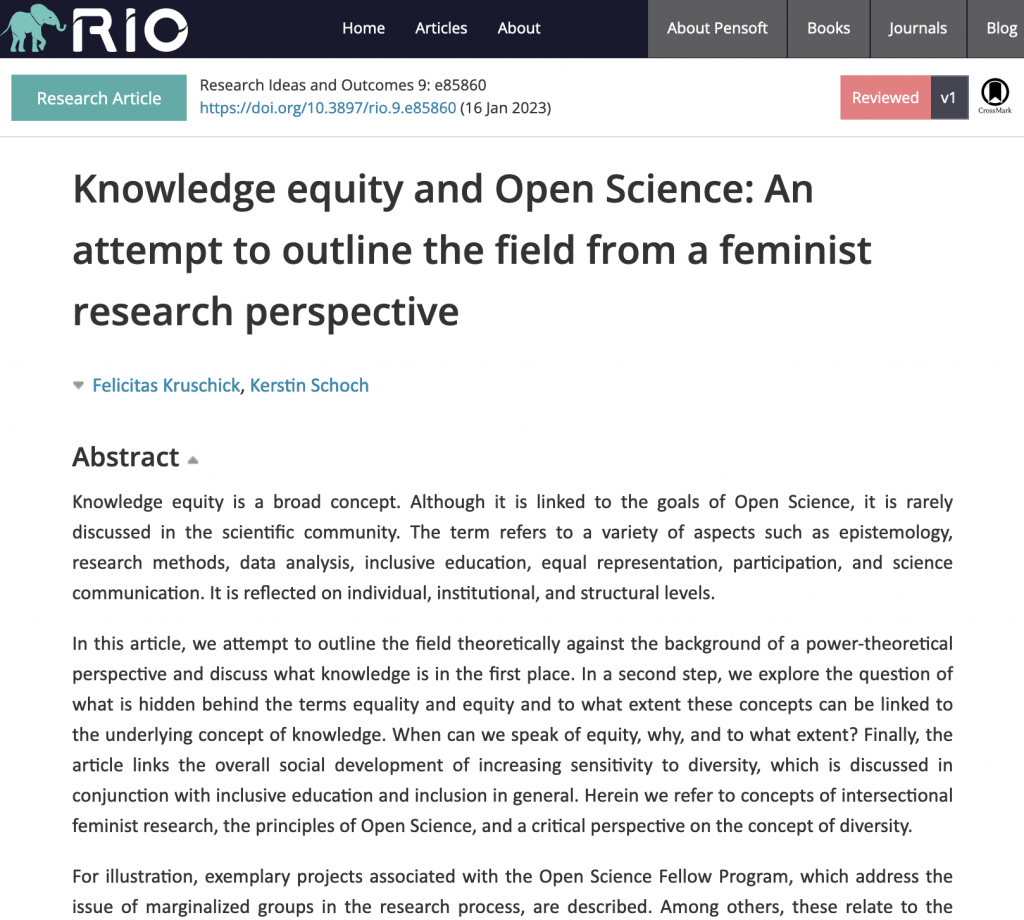Für mehr feministische Forschungspraktiken. Gerade haben Felicitas Kruschick und ich unseren wissenschaftlichen Artikel zu Wissensgerechtigkeit und Open Science veröffentlicht. Die Publikation ist Teil des RIO Special Issues Bootstrapping the Open Science culture im Rahmen des Fellow-Programms Freies Wissen von Wikimedia Deutschland. Wie immer ist das Ganze natürlich Open Access.

abstract
Knowledge equity is a broad concept. Although it is linked to the goals of Open Science, it is rarely discussed in the scientific community. The term refers to a variety of aspects such as epistemology, research methods, data analysis, inclusive education, equal representation, participation, and science communication. It is reflected on individual, institutional, and structural levels.
In this article, we attempt to outline the field theoretically against the background of a power-theoretical perspective and discuss what knowledge is in the first place. In a second step, we explore the question of what is hidden behind the terms equality and equity and to what extent these concepts can be linked to the underlying concept of knowledge. When can we speak of equity, why, and to what extent? Finally, the article links the overall social development of increasing sensitivity to diversity, which is discussed in conjunction with inclusive education and inclusion in general. Herein we refer to concepts of intersectional feminist research, the principles of Open Science, and a critical perspective on the concept of diversity.
For illustration, exemplary projects associated with the Open Science Fellow Program, which address the issue of marginalized groups in the research process, are described. Among others, these relate to the following focal points: Data collection of non-binary gender, awareness of adultism, collaborative interpretation with interviewees, queer narratives, diversity in editorial boards, research in the context of North-South relations, participatory science communication using art, and exclusion factors of science communication.
The overarching question we ask in this article is the extent to which knowledge equity is relevant to marginalized groups and exclusive dynamics in terms of an inclusive rationale and how those dynamics can be identified by using critical perspectives and self-reflexive considerations.
Kruschick, F., & Schoch, K. (2023). Knowledge equity and Open Science: An attempt to outline the field from a feminist research perspective. Research Ideas and Outcomes 9, e85860. https://doi.org/10.3897/rio.9.
danke
Ein großes Danke geht an Thomas Gengenbach, Lily Martin, Maria Henkel und Jana Hoffmann für euer wertvolles Feedback zum Manuskript sowie an RIO und Wikimedia Deutschland für die Ermöglichung dieses Special Issues zu Open Science. Felicitas, es war mir ein Vergnügen, mit dir zu arbeiten!
